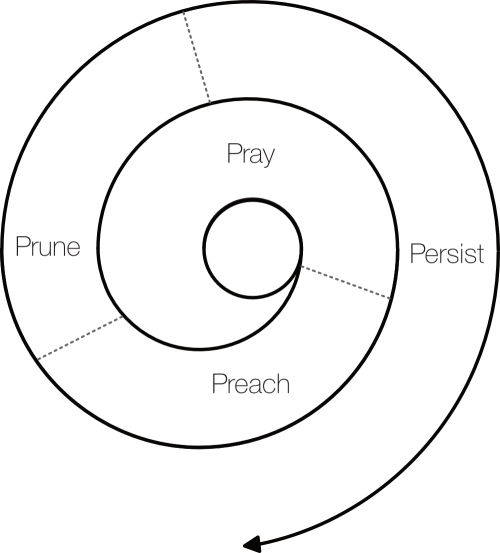Our Ministry Strategy
The following was originally written by Nick Weber for the Covenant Membership Handbook.
At Mercy Hill, we have a three-part interlocking ministry strategy. We have a: (1) Strategic Focus; (2) Strategic Rhythm; and (3) Strategic Activity.
1. Strategic Focus: We Are a One-Issue Church
One Issue
Churches can be known for all sorts of things—“That’s the church where the band is radio-quality”; “That’s the church where the pastor is like a stand-up comedian”; “That’s the church where they give away fresh pour-over coffee that tastes like it just dripped down from heaven.” Do you know what we pray people come to say about us? “That’s the church where they just can’t get over the cross. They’re always teaching about it, singing about it, talking about it, moved by it, showing it, sharing it.”
In this sense, then, we want to be a one-issue church. There are so many things our focus could drift to, but we will labor with all of our might to keep us focused here. Because God is focused here.
Do you remember Jesus’ rebuke of the Jews? “You search the Scriptures because you think that in them you have eternal life; and it is they that bear witness about me” (John 5:39). “Everything in the Bible—every word God ever said—is pointing you to Me and what I’m about to accomplish for you on the cross!”
Or do you remember what Paul says is of “first importance” in 1 Corinthians 15:3? “The gospel” (v. 1)—namely, “that Christ died for our sins in accordance with the Scriptures,that he was buried, that he was raised on the third day in accordance with the Scriptures” (vv. 3–4). Whatever else we believe or do as a church, this gospel is to take first place!
Or when Paul knows he’s leaving the church in Ephesus, never to see them again, what does he leave them with? “And now I commend you to God and to the word of his grace, which is able to build you up and to give you the inheritance among all those who are sanctified” (Acts 20:32). “Oh I know you’ve already heard the gospel Ephesians, but you need to hear it again and again and again. For it is not only how you get saved, it is how you are sustained unto glory.” When we preach the gospel in this church, Paul is saying, we might as well be mixing cement and laying down bricks. For it is the word of His grace that builds His people up!
That’s why he would say to the Corinthians: “I decided to know nothing among you except Jesus Christ and him crucified” (1 Cor 2:2). And that’s why the first sermon series I ever preached through at this church was on this same verse! The cross of Christ was the first note I struck, and I pray by God’s grace I will strike that same note until the day I drop! May my ministry be a never ending riff on this one master theme: "Jesus Christ and him crucified."

One Million Implications
This is not to say that we will not talk about anything else in this church. We most certainly will. It is to say, however, that whatever else we talk about, we will approach it through the lens of the gospel. You see, this one issue touches every issue. We may focus in on this one issue, but this one issue has one million implications. This is the flow of almost every epistle in the New Testament. First, let’s get the gospel right. Then, let’s talk about what it implies for your Faith, Community, and Mission. What does the gospel imply for your relationship with God, with your spouse, with your kids, with your work, with your finances, with your neighbor, with the orphan and the widow, and on and on?! Knowing God’s unconditional, even counter-conditional, love for us in Christ is what gives rise to fire-hearted Faith, deep-rooted Community, and life-sacrificing Mission.
By God’s grace, we will keep this one issue at the center. But, in the years to come, we will set out to discover the one million implications that flow out from it.
2. Strategic Rhythm: We Gather and Scatter
With the gospel as our Strategic Focus, we operate within a Strategic Rhythm. As a church, we gather and we scatter. We gather together as believers and then we scatter out into the world for Christ. Both sides of this rhythm are critical in the fulfillment of our mission and the pursuit of our values.

To help you see how the two relate, let us put an image on it. When we speak of our gathering and scattering, think of the ebbing and flowing of the ocean’s tide. The water recedes out into the depths and then pushes back onto the land. But even as the water recedes it leaves something of the depths on the shore—shells, sand-dollars, even sea creatures in some of the tide pools.
My dad’s side had a family reunion this past summer in a place called Fripp Island off the coast in South Carolina. At low-tide we would walk the beach looking for these sorts of things. If we got there too late, the best treasures would have already been taken by other tourists. But without fail, the tide would come back up from the depths, with more shimmering treasure in its flow.
Think about our Strategic Rhythm along these lines. We have gatherings—some larger, some smaller—scheduled throughout the week—opportunities to move towards the breathtaking depths of God’s glory with His people. But we don’t stay out in the depths any more than the tide stays out at sea. The tide returns, it comes back in towards land, towards the world. And when we move back in from the depths we bring tokens of our time with us—precious shells, as it were, that speak something to the world of the beauty and glory of our God. And we lay these shells out along the banks, like a trail of crumbs leading back to their source in Him.
Our family members, friends, neighbors, co-workers see our faith, our hope, our love, our joy, our peace; and they hear us speak of a world they’ve not yet seen but always longed for. They hear us speak of the love of God for sinners, of a redeemed and reconciled community, of a mission bigger than our day-planners and board meetings. They hear us speak of the church gathered.
And perhaps they’ll be inclined to follow the crumbs, the shimmering shells, the sightings of glory, back out to the sea. Perhaps they’ll want to catch a glimpse for themselves. Perhaps they too will find themselves breathless before the vast expanse of God’s glory and grace. Perhaps they too will come to know the love of God for them in Christ. Perhaps they too will start to bring shells up from the deep and lay them out for the world to see.
At Mercy Hill, we do not pin the gathered church against the scattered church. Some think that Christians spend so much of their time gathering that they have no time to scatter out and reach the world. Now this is a legitimate concern. But many overreact in the other direction and start to spend so much of their time scattering that they lose the glow and shimmer that comes from spending time in worship with God’s people.
Both extremes are problematic. We gather so that we can scatter—with renewed energy and zeal. We scatter so that we can gather—so that more and more people might come into the redeemed community of God.
Beyond this, we believe that the gathering is equally as missional as the scattering. We might be prone to think that the gatherings are where we really work out our Faith and Community, and the scattering is where we finally do Mission. But the Bible knows nothing of this disparity. The gathered church is, in fact, a compelling witness to the power and validity of the gospel. It is the theater of God’s glory, the showcase of a new humanity. What the unbelieving might not get from our tracts or gospel presentations, they just might get from witnessing our gatherings!
Read Acts 2:42-47. It was in light of the gathered church—their apostolic Faith, their radical, self-sacrificing Community—that they were given “favor with all the people. And the Lord added to their number day by day those who were being saved” (v. 47). Faith and Community worked out in the context of the gathered church is not at odds with the mission, it’s a critical component of it! Paul Himself assumes unbelievers will come into our gatherings. And he imagines some “falling on [their] face[s] . . . worship[ing] God and declar[ing] that God is really among [us]” (1 Cor 14:25).
John Bunyan describes how, before his conversion, he came upon a gathering of poor Christian women talking about the things of God: “I thought they spoke as if joy made them speak. They talked with such pleasantness of scriptural language and with such appearance of grace in all they said that they seemed to me as if they had found a new world.”1 Don’t you want people to come in here and say that of us?
So we gather in our services, in our Home Groups, in our prayer meetings; and we scatter into the city, into the neighborhoods, into the workplaces, into the grocery stores. We are not either/or on this issue. We are both/and. We gather and we scatter.
1 Grace Abounding to the Chief of Sinners (New Kensington, PA: Whitaker House, 1993), 25.
3. Strategic Activity: We Pray, Preach, Prune, and Persist
So many are scrambling these days, looking for new ways to grow the church. But we have to know that God cares infinitely more about church growth than we do. As such, He has not left the subject up to us. We do not need, nor should we dare, to reinvent what He has already laid down for us on the matter in His Word.
The book of Acts is concerned at a fundamental level with church-growth. It’s grand thesis is Acts 1:8: “[Y]ou will receive power when the Holy Spirit has come upon you, and you will be my witnesses in Jerusalem and in all Judea and Samaria, and to the end of the earth.” And the rest of the book is given over to detailing the unfolding fulfillment of this thesis. The gospel, the church, is growing.
While I would never claim that the book of Acts is a manual for church growth, I do think it identifies a dynamic, a strategic activity, that should not go ignored. It’s an activity that works out in four key steps: (1) We Pray; (2) We Preach; (3) We Prune: (4) We Persist.

Here is just one illustration of this from the book of Acts (though, really, this strategic activity appears again and again throughout the book).
1. We Pray
It’s interesting that, though Jesus says these disciples are going to be His witnesses even to the ends of the earth, His first order is that they “not . . . depart from Jerusalem, but . . . wait” (Acts 1:4). And after Jesus ascends and they are waiting in Jerusalem, what is it that they are doing? Praying: “All these with one accord were devoting themselves to prayer” (v. 14).
In a very real sense, growing the church, whether in quality or quantity, is not in a pastor’s (or any Christian’s) job description. That responsibility belongs to God alone: “I planted, Apollos watered, but God gave the growth” (1 Cor 3:6). If this is true, then, more important than any of our planting or watering, is our praying: “O God do what only You can do!” That’s why my first move as pastor here was to start the Sunday evening prayer meeting. Prayer is the start of everything good.
2. We Preach
As they are praying and waiting, the Spirit of the risen Christ falls upon them. And what to do they do? They preach: “Peter, standing with the eleven, lifted up his voice . . . “ (Acts 2:14). He proclaims the gospel, and three thousand souls awaken from the dead.
Who cares what the modern world may think of preaching. God says that it is His ordained means by which He calls this world full of Lazarus’ out of the tomb. So, God help us, as a church we will give ourselves to the preaching and ministering of His Word, whether we are gathered in our worship services or scattered throughout the city. For as the Word increases, so does the church (Acts 6:7; 12:24; 19:20).
3. We Prune
They Pray, they Preach, and thousands are added. The church begins to grow. The gospel takes root in the hearts of people and starts to bear fruit in their lives. By Acts 6, there’s so many people to take care of that the Apostles have to appoint others to help. They raise up new leaders and create new ministries around them. They develop systems and structure to support the growth and encourage the flourishing of the church’s members. In other words, as the church grows, they Prune it, to keep things going strong.
In this church, we want to Pray, we want to Preach, and then we want to sit back and watch how God stirs your heart. We want to see what kind of fruit crops up in your life. And then we want to tend the branches and help you flourish.
While we are unswervingly rigid on certain points of the ministry, we are actually quite flexible in our approach. Outside of the broad parameters laid out in our mission, values, and ministry strategy, we don’t have the specifics worked out.
We know we want to see you restored to God, neighbor, and city. We know, as a church, we are pursuing Faith, Community, and Mission. But who’s going to preach on Sundays, what studies are we going to have, what events will we do to grow together, what kind of outreach should we get involved in? We as a leadership might have things God puts on our hearts here or there, but we are trusting God to put things on your heart as well. We see ourselves not only as sources of the church’s vision, but as stewards of it as well. Meaning: yes, we will have ideas and vision for the church. But no, our opinions are not the only ones that matter. We want to see how and what God is moving in you and then equip and release you to do it!
4. We Persist
We minister in a fallen world. It’s going to be hard. After Acts 6 comes Acts 7, and the stoning of Stephen—the first martyr of the New Testament church. Now you might think that such a thing would cause the church to lose hope or give up. But instead they Persist.
It seems only to get stronger. For the great persecution that arises in all of this actually serves to help the church break those first barriers that Jesus mentioned (back in Acts 1:8): “[T]here arose on that day a great persecution against the church in Jerusalem, and they were all scattered throughout the regions of Judea and Samaria . . . [And] those who were scattered went about preaching the word” (8:1, 4).
I can’t tell you how important this fourfold Strategic Activity has been for me throughout my time in ministry here. I get discouraged. I get tempted to turn to other methods. But then I come back to this: “Oh Nick! Don’t lose heart. Pray, Preach, Prune, and Persist! Stay the course for the long haul and let God do what only He can do. Let God bring the growth.”
I live in those words that the Apostle Paul wrote to Timothy: “Keep a close watch on yourself and on the teaching. Persist in this, for by so doing you will save both yourself and your hearers” (1 Tim 4:16).
Will you join us in executing this interlocking strategy? Will you make the gospel central? Will you gather and scatter? Will you partner with us in praying, preaching, pruning, and persisting? We so hope that you will!
